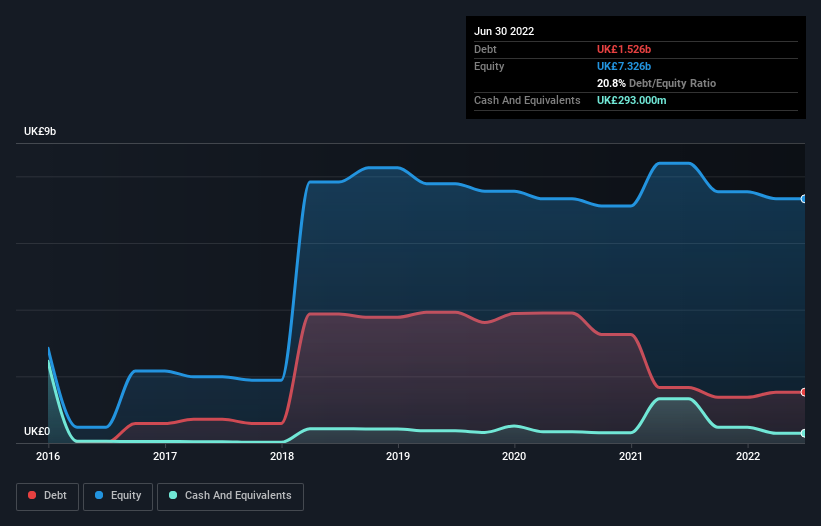- United Kingdom
- /
- Aerospace & Defense
- /
- LSE:MRO
Health Check: How Prudently Does Melrose Industries (LON:MRO) Use Debt?

Warren Buffett famously said, 'Volatility is far from synonymous with risk.' So it seems the smart money knows that debt - which is usually involved in bankruptcies - is a very important factor, when you assess how risky a company is. We can see that Melrose Industries PLC (LON:MRO) does use debt in its business. But the real question is whether this debt is making the company risky.
When Is Debt Dangerous?
Debt and other liabilities become risky for a business when it cannot easily fulfill those obligations, either with free cash flow or by raising capital at an attractive price. Ultimately, if the company can't fulfill its legal obligations to repay debt, shareholders could walk away with nothing. However, a more common (but still painful) scenario is that it has to raise new equity capital at a low price, thus permanently diluting shareholders. Having said that, the most common situation is where a company manages its debt reasonably well - and to its own advantage. When we think about a company's use of debt, we first look at cash and debt together.
Our analysis indicates that MRO is potentially undervalued!
What Is Melrose Industries's Net Debt?
The image below, which you can click on for greater detail, shows that Melrose Industries had debt of UK£1.53b at the end of June 2022, a reduction from UK£1.66b over a year. However, it does have UK£293.0m in cash offsetting this, leading to net debt of about UK£1.23b.

How Strong Is Melrose Industries' Balance Sheet?
The latest balance sheet data shows that Melrose Industries had liabilities of UK£4.00b due within a year, and liabilities of UK£3.45b falling due after that. Offsetting this, it had UK£293.0m in cash and UK£1.50b in receivables that were due within 12 months. So it has liabilities totalling UK£5.66b more than its cash and near-term receivables, combined.
When you consider that this deficiency exceeds the company's UK£5.37b market capitalization, you might well be inclined to review the balance sheet intently. In the scenario where the company had to clean up its balance sheet quickly, it seems likely shareholders would suffer extensive dilution. The balance sheet is clearly the area to focus on when you are analysing debt. But ultimately the future profitability of the business will decide if Melrose Industries can strengthen its balance sheet over time. So if you're focused on the future you can check out this free report showing analyst profit forecasts.
In the last year Melrose Industries's revenue was pretty flat, and it made a negative EBIT. While that's not too bad, we'd prefer see growth.
Caveat Emptor
Over the last twelve months Melrose Industries produced an earnings before interest and tax (EBIT) loss. To be specific the EBIT loss came in at UK£328m. Considering that alongside the liabilities mentioned above make us nervous about the company. We'd want to see some strong near-term improvements before getting too interested in the stock. Not least because it burned through UK£191m in negative free cash flow over the last year. That means it's on the risky side of things. When I consider a company to be a bit risky, I think it is responsible to check out whether insiders have been reporting any share sales. Luckily, you can click here ito see our graphic depicting Melrose Industries insider transactions.
When all is said and done, sometimes its easier to focus on companies that don't even need debt. Readers can access a list of growth stocks with zero net debt 100% free, right now.
New: Manage All Your Stock Portfolios in One Place
We've created the ultimate portfolio companion for stock investors, and it's free.
• Connect an unlimited number of Portfolios and see your total in one currency
• Be alerted to new Warning Signs or Risks via email or mobile
• Track the Fair Value of your stocks
Have feedback on this article? Concerned about the content? Get in touch with us directly. Alternatively, email editorial-team (at) simplywallst.com.
This article by Simply Wall St is general in nature. We provide commentary based on historical data and analyst forecasts only using an unbiased methodology and our articles are not intended to be financial advice. It does not constitute a recommendation to buy or sell any stock, and does not take account of your objectives, or your financial situation. We aim to bring you long-term focused analysis driven by fundamental data. Note that our analysis may not factor in the latest price-sensitive company announcements or qualitative material. Simply Wall St has no position in any stocks mentioned.
About LSE:MRO
Melrose Industries
Provides aerospace components and systems to civil and defence markets in the United Kingdom, rest of Europe, North America, and internationally.
Reasonable growth potential with mediocre balance sheet.


